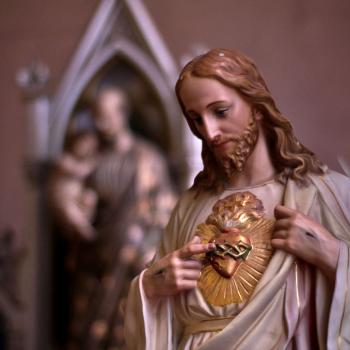
I’ve been reading a book titled Jesus Behaving Badly, and it reminds us that the Jesus of the New Testament exhibited more than a few human traits. Author Mark L. Strauss calls them “the puzzling paradoxes” and they include Jesus losing his temper (Matthew 23:33), Jesus railing against families (Mark 10:29-30) and Jesus being vengeful (the parable of the fig tree).
Which got me thinking—if Jesus occasionally showed flashes of anger or spite, didn’t he also experience the whole spectrum of human emotions—including joy and wonder and, dare I say it, lust and romantic love?
I bring this up, in part, because of the recent press on Jesus and his relationship with Mary Magdalene. A few months ago an ancient papyrus fragment was discovered called “The Gospel of Jesus’s Wife”. While the jury is still out on its authenticity, in it Jesus refers to Mary as his wife. But it is not the only evidence that a special relationship existed between Jesus and Mary.
While most of us are familiar with the four gospels found in the Bible, in the first few centuries of Christianity there were dozens of gospels in wide circulation about the life and teachings of Jesus. These gospels were passed around fledgling churches throughout the Mideast and beyond, and show the rich diversity of early Christian beliefs.
These alternate narratives of Jesus are part of what is known as the Gnostic gospels. But during the year 325, Constantine, the emperor of Rome, called a conference with the aim of literally getting all Christians on the same page. And only the gospels of Mark, Matthew, Luke and John were officially sanctioned, while all other gospels were excluded—and banned by the church.
What we lost with this purge of competing gospels was a richer, more fully developed picture of Jesus the man, especially as it relates to his close relationship with Mary. Take the three excerpts from the Gnostic texts below, the first is from Gospel of Phillip, the two that follow are from the Gospel of Mary:
The companion of the Son is Miriam of Magdala.
The teacher loved her more than all the disciples;
He often kissed her on the mouth.
Peter said to Mary, “Sister, we know the savior loved you more than any other woman. Tell us the words of the savior that you remember, which you know but we do not, because we have not heard them.”
Levi said to the other disciples: “Surely the Lord knew her very well. That is why he loved her more than us”
As the author Thomas Moore states in Writing in the Sand, while Mary was at one time confused with a prostitute by the same name in the bible (perhaps intentionally by those in the church seeking to downplay her importance), she is now recognized as “perhaps the beloved disciple to whom the Gospels never refer by name, and a figure of great importance in the earliest leadership of Jesus’ followers.”
Over the years, the legend of Mary Magdalene has grown and there have been books written that make the case that she and Jesus were even husband and wife. Several, including Holy Blood Holy Grail, lay out evidence that after the death of Jesus, a pregnant Mary traveled to France, gave birth and began a long line of Jesus’ descendants.
But to me what is most intriguing is the relationship Jesus and Mary Magdalene had in life. Did the love of this close disciple cross over into a romantic relationship? As Moore points out:
What is shocking about the new view of Mary Magdalene and Jesus, of course, is the implication that Jesus was not celibate. People who see Jesus in an entirely spiritual light may have trouble considering the possibility that he was a sexual being as well. Yet…if you’re going to acknowledge Jesus’ humanity, you have to include his sexuality.
Does it matter if Jesus had a romantic relationship with Mary Magdalene? For some in the church it poses a problem, who I suppose see Jesus as above the earthly desire for romance and sex. But I believe this notion presents us with a Jesus that is easier to relate to, a savior that knows first-hand not just the pain and foibles of our flesh and blood experience, but also its pleasures. As Moore writes:
How you imagine Jesus’ sexuality may depend on how you feel about sex. If you think it’s contemptible or at least a low part of human nature, you may not want a sexual picture of Jesus. If you see the beauty and full significance of sexuality, you may understand how important it is to allow Jesus his sexuality. Anything less acknowledges his incarnation except for sexuality—and that makes no sense.












